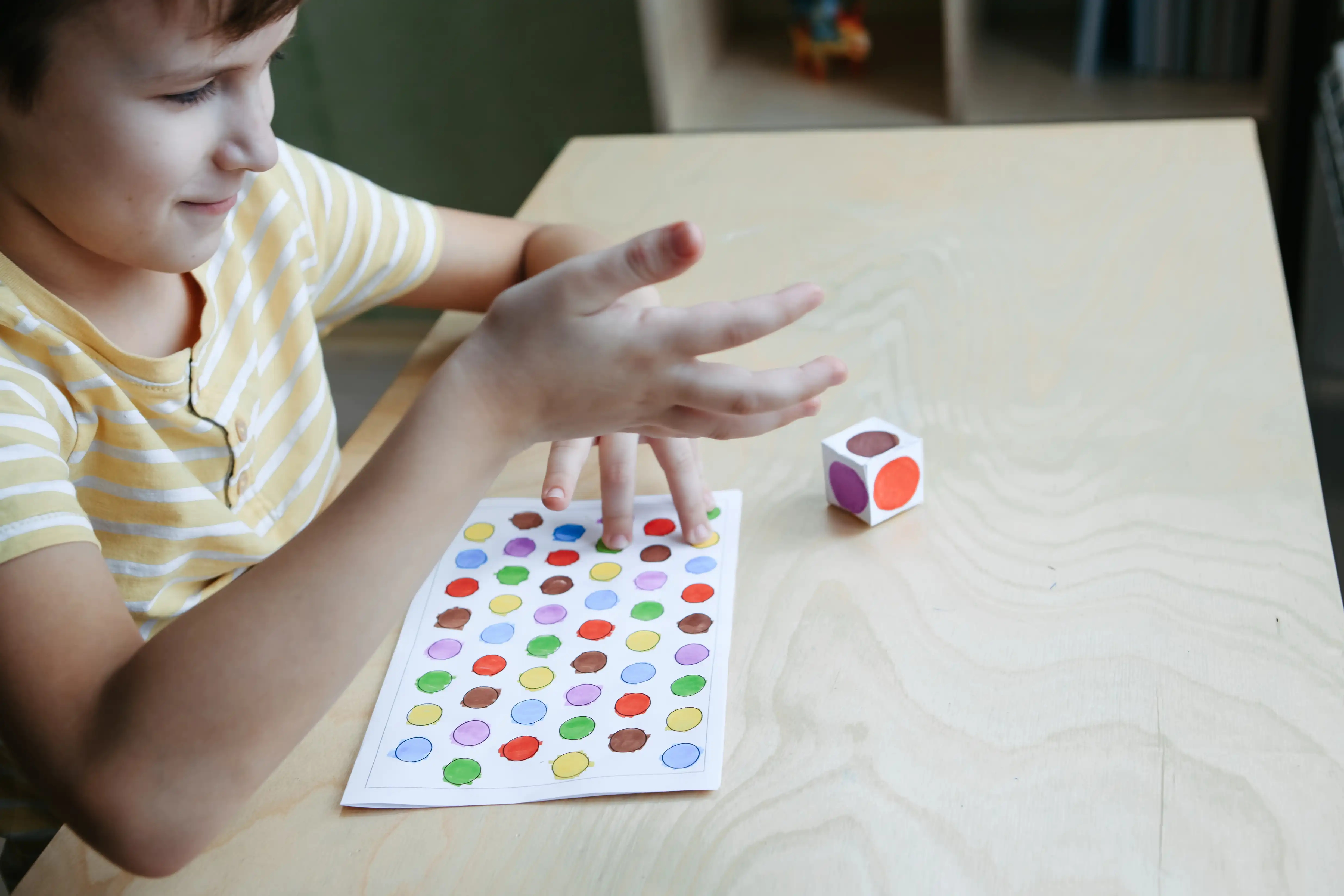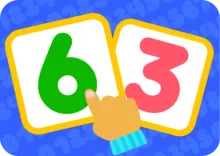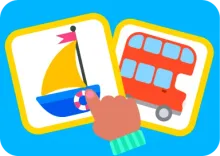Best Interactive Dice Games For Kids of Different Ages
Dice games add surprise and simple rules that kids can learn fast. These ideas support counting, turn-taking, and flexible thinking, making them great for family time, classrooms, or small groups.

Dice games for kids to practice counting and turn-taking
Dice games for kids are classics for entertaining kids, enriching classroom activities, and having fun during parties and gatherings. These exercises are great for teaching basic maths skills, probability, and visual perception. In this article, we will discuss dice game ideas for children with different goals aimed at various age groups and requiring diverse levels of preparation.
The Benefits of Fun Dice Games for Kids
These simple but easy-to-use activities can be great for engaging kids while remaining educational and appealing. These exercises are versatile and can be changed easily to your kid’s needs. They help develop different skills, including cognitive and social-emotional ones.
Above all, easy dice games are a fun way to introduce your child to basic math. Playing them will help practice basic mathematical operations like addition, subtraction, and multiplication. Besides, many activities require planning and creating a certain strategy. This facilitates goal-oriented thinking and decision-making.
These math games with dice are often challenging, and children need to approach and solve different issues to achieve a certain outcome. This way, they develop problem-solving skills. The players also learn to recognize patterns, understand the concept of probability, and improve analytical skills.
In addition, many activities are designed for teamwork. They help kids develop social skills like negotiation, organization, and dividing responsibilities.

Help your child
grow with Keiki
We’ll help you turn everyday screen time
into real learning progress.
How Math Dice Games Make Learning Fun
Although these activities help develop complex skills, they are pretty simple and hands-on. These exercises have an element of chance, which is key to adding fun and engagement. It keeps players excited and motivated to continue the game. Such games require active participation, which can help students stay focused and involved in the learning process.
Simple Math Dice Games
Having a couple of dice at home or in a classroom can help you introduce a wide range of activities to kids. Here are the ideas for easy dice games for kids. Generally, they are straightforward to set up and require little to no preparation.
1. Tenzi
It is a fast-paced activity suitable for children of different age groups. Each player has ten dice and races to roll all of them to the same number. The first one to achieve this yells “Tenzi” and wins the round. It is fun, easy, purely luck-based, and doesn’t require any specific skills to win. This game also encourages quick thinking and decision-making. To set it up, you only need ten dice per player.
2. Roll to 100
During this dice game for kids, players take turns rolling a single dice. They add the rolled number to their total. The goal is to be the first to reach exactly 100 without going over. It is simple and ideal to introduce basic arithmetic skills like counting and probability understanding. All you need is enough dice for each participant and a way to keep track of the score, such as a calculator or a piece of paper to write it on.
3. Over the Mountain
The players roll dice to move their game piece up a mountain on a game board. Each number rolled corresponds to a specific distance moved. The first to the top wins. You need a special board and pieces for this activity. Aside from maths skills and probability, this roll-the-dice game also teaches strategy. It is fun to play but may not be suitable for large groups.
4. Math War
Participants roll two dice and use the numbers to create an arithmetic problem, such as addition, subtraction, multiplication, or division. Depending on the chosen operation, the learner with the highest or lowest result wins the round. This competitive game is great for developing quick thinking and basic arithmetic skills.
5. Shut the Box
During this get-to-know-you dice game, the children roll them and then shut a combination of numbered tiles that add up to the total rolled. The goal is to close as many tiles as possible. The player with the lowest score at the end wins. This game teaches addition, probability, and strategic planning.
Engaging Strategy Dice Games
These activities are ideal for keeping the players entertained and invested for a long time. Here are some suggestions for games with dice only that may work for kids of different age groups.
6. Pig
Players take turns rolling a single dice as many times as they like. The numbers rolled are added to a running total. A player may stop and “hold” their score to end their turn. If they roll a 1, they lose all points accumulated during that turn. This activity teaches risk assessment, fast counting, and strategic thinking. This is one of the fast-paced and interactive dice math games. You need one dice and a piece of paper to write the score.
7. Knock Out
During this dice get-to-know-you game, the kids choose a number between 2 and 12 as their “knock-out” number. Each player rolls two dice and adds the numbers together. If the sum equals their knock-out number, they are out of the game. The last participant remaining wins. This is a fast and easy game that teaches children probability in an engaging way.
8. Stuck in the Mud
For this activity, the participants roll five dice. Any dice showing 2 or 5 are set aside ( they are the ones stuck in the mud) and cannot be rerolled. The player continues rolling the remaining dice and accumulates points from the non-2/5 dice until all dice are stuck. The player with the highest score after a set number of rounds wins. This game is based only on luck and has an element of risk management.
9. Fifty
The players need to take turns. If a participant rolls a 5, they score 5 points; if they roll a 2, they lose 2 points. The first player to reach exactly 50 points wins. If a roll causes a score to exceed 50, they lose that turn’s points. The participants have to balance the need to score points with the risk of going over the target. This game requires attention, strategy, and planning.
10. Three or More
Players roll three dice and score points based on matching numbers. Three-of-a-kind score points equal to the number. For instance, three 4s score 4 points. Four-of-a-kind doubles the points, and five-of-a-kind triples them. The player with the highest score after a set number of rounds wins. This game facilitates quick calculations and teaches pattern recognition. You only need three dice per player and a piece of paper to note the score.

Creative and Educational Games to Play with Dice
Sometimes, these activities can go beyond basic arithmetic. These exercises spark creativity and help players learn new things.
11. Roll-a-Word
In this activity, players roll a set of dice with letters instead of numbers. Then, they have to form words using the letters that appear on the dice. The longer and more complex the word, the more points the participant scores. This game is ideal for enhancing vocabulary, creativity, and quick thinking. It can be easily adapted to different skill levels and age groups.
12. Roll and Write
Participants roll dice and then write sentences or stories based on the numbers rolled. Each number corresponds to a different prompt or element. For instance, 1 for a noun and 2 for a verb. This is a go-to game for practicing creative writing and improving storytelling and grammar skills. It can be played individually or in teams.
13. Block Out
This activity involves rolling dice to strategically place blocks on a grid. The objective is to create the largest connected area without gaps while blocking opponents from doing the same. It requires grid or graph paper, markers, or pencils. It works for developing strategic skills and quick problem-solving.
14. Dueling Narrators
This is one of the more complex fun dice games suitable for small groups. Two players take turns rolling dice and adding to a collaborative story. Each number dictates a specific type of sentence or action. For example, 1 for introducing a new character, 2 for describing a setting. This game enhances creativity, collaboration, and improvisation. You can come up with hilarious or intricate stories. With its unpredictable nature, this activity keeps the members engaged for a long time.
15. Pirates!
During this strategy challenge, players navigate a treasure map by rolling dice. They also encounter various challenges and collect treasures. Each number on the dice represents different actions or obstacles. For instance, 1 represents moving forward, 2 represents finding treasure, and 3 represents meeting a pirate. You need a special treasure map and action list for this activity. It facilitates planning, problem-solving, and decision-making.
Build real skills through fun, educational games for your child
Try KeikiEducational Value of Dice Games
These exercises can be an excellent addition to the learning process. They are fun, simple, and engaging for children. Here are the key benefits of incorporating games with dice only into your classroom routines.
- Enhancing Math Skills. These activities require players to complete basic math operations, such as addition, subtraction, multiplication, or division. By repeating them, the kids learn how to perform them quickly and correctly. Kids learn about probability and statistics and recognize patterns.
- Promoting Cognitive Development. Many dice games involve strategy and critical thought, motivating players to think ahead and plan their moves. They also require good memory, concentration, and logical thinking.
- Encouraging Social Skills. Team dice activities involve many aspects of social interaction, from taking turns and negotiating to sharing experiences and active discussions.
- Fostering Creativity. Some dice games incorporate storytelling elements. They let players create narratives and scenarios based on the outcomes of their rolls. During many activities, the players need to find extraordinary ways to overcome challenges.
Overall, these are great options for different classes. In addition to math, you can integrate them into listening, speaking, and creative exercises.
Keiki World App: Best Learning Games for Kids
Incorporating online learning into your children’s educational process can have many advantages, especially when you use comprehensive platforms like Keiki World App. This application provides different games and activities that help children develop essential skills. Here are the key advantages of using this platform:
- Different learning topics. The educational activities are focused on important themes for young and preschool learners, such as letters, numbers, shapes, and colors. They also incorporate various subjects, such as city life and marine life.
- Ad-free and secure environment. Keiki World App doesn’t include ads, which means the learners are not distracted or interrupted during the learning process. This facilitates more consistent experiences for young children.
- Engaging games and activities. You can choose from fill-in-the-gap activities, memory challenges, jigsaw puzzles, letter tracing, and other exercises. This diversity of things to engage in makes learning experiences more individualized and interactive.
- Customizability and flexibility. You can modify the educational plan to your child’s age, interests, and needs. This helps it remain adjustable to different conditions.
You get access to a wide range of learning resources that can supplement your child’s learning or serve as the main learning platform. You can adjust the educational process to your kid’s needs.
Related Games in Keiki App
Conclusion
Easy dice games are straightforward and easy to set up and understand. Their primary goal is to develop math skills, but they can also be used to work on different other aspects, such as problem-solving, quick, creative thinking, and strategy. We hope that you have found some appealing ideas from this article.
















